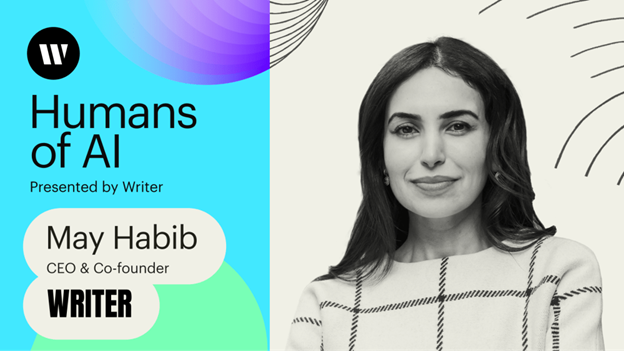Pathbreakers of Arab America—May Habib

By: John Mason / Arab America Contributing Writer
This is the seventy-eighth of Arab America’s series on American pathbreakers of Arab descent. The series includes personalities from entertainment, business, sports, science, arts, academia, journalism, and politics, among other areas. Our seventy-eighth pathbreaker, May Habib, is an immigrant with her family from Lebanon to Canada, then to the U.S. She is the co-founder and CEO of ‘Writer,’ an artificial intelligence (AI) and language services and digital content company that offers writing assistance for teams. May is at the forefront of the AI/ChatGBT initiative.
Being comfortable with discomfort, May Habib constructed a business worldview that embodies her modest beginning and proud Arab cultural roots
Born in rural Lebanon, the eldest of eight children, Habib emigrated to Canada with her family at age eight. Limited personal information regarding May’s private life, including details about her family, religious beliefs, or political affiliations, is publicly accessible. She studied at Harvard headed the news board for the college newspaper and graduated with high honors, including degrees in Economics and Near Eastern Languages and Civilizations. Habib is a member of the World Economic Forum and a Fellow of the Aspen Global Leadership Network.
According to one bio, “May Habib likes languages.” She and her business partner grew up in non-English-speaking households. This, accordingly, “shaped their belief that the language you were born speaking shouldn’t impact the kind of life you lead. If they could help people be more effective communicators, they figured, they could help them unleash their full potential.”

May contends that in growing up in an immigrant family, she “often found herself navigating unfamiliar territories, which instilled in her a resilience and a knack for taking risks.” In this context, she became “comfortable being uncomfortable, being scared.” Reflecting on her journey, May avers that “her upbringing forced her to put herself out there, facing uncomfortable situations head-on constantly. It was through these experiences that she developed the courage to embrace risks and seek out discomfort.”
Habib has translated her comfort with discomfort and her ability to withstand risk into a business model. For customers, May’s model has allowed them to “automatically localize their content for different regions and languages.” Once entering a new market, the customer needs to know everything that goes into that new marketing language.
On a more technical level, Habib’s Writer product involves three basic components:
- ‘Generative Artificial Intelligence (AI) Platform’: Writer is a generative AI platform for the enterprise, offering tools and solutions to help businesses leverage the power of AI for various tasks.
- ‘Enterprise Use’: The platform is specifically designed for enterprise use, providing tailored solutions to meet the needs of businesses.
- ‘AI Integration’: Writer integrates AI into various business processes, enhancing efficiency and productivity.
These components contribute to a process in which AI will lead to enhanced productivity and ultimately revolutionize work. Accordingly, May “envisions a future where AI technology can streamline processes, automate mundane tasks, and free up human potential for more creative and meaningful work.” Thus, AI is seen as a game-changer in how people work together and what they can achieve.
Before co-founding Writer, Habib founded Qordoba, a language services and digital content company based in Dubai that works with over 650 linguists in 30 countries. Earlier, she was the mergers and acquisitions director at Mubadala and an investment banker at Lehman Brothers and Barclays Capital, New York.
Yet another part of May’s business model is the use of stories—the core of what makes us human. They shape how we see the world, how we see ourselves, and the impact we have on others. May maintains, “In the age of AI, this simple truth will help light our way as we strive to transform the world around us for the better.”
An equally important part of Habib’s business model is AI’s potential not only to revolutionize work but also its role in creating equity among its users. It is in May’s experience as an immigrant that she saw the vast variety of differences among people. She contends, in the absence of equity, “We could end up with a really dystopian future where most jobs are done by AI employees and folks who already would have been top of the food chain, you know, that much more productive as a result of having all that leverage.” Thus, May cautions that AI requires a responsibility to promote equity and inclusivity.
Employing her tolerance to risk and comfort with people who are different, Habib takes a contrarian path in AI innovation
May and her partner in the Writer enterprise decided to build their own AI models and platform, even as others suggested leveraging existing models. In an interview, Habib revealed, “By daring to be different and embracing the power of taking a different path, we can unlock new possibilities and shape a future where AI is not just a tool but a force for positive change.” However, some of the risks Writer takes have to be shared by the client. “This recognition of shared risk fosters collaboration and mutual understanding, namely, trust.

Just to give the readeran impression of the complexity of Writer’s approach to AI, we mention three of its large language models, launched in February 2023: Palmyra-Small with 128 million parameters, Palmyra-Base with 5 billion parameters, and Palmyra-Large with 20 billion parameters. Given its expansion into these huge models, Writer as a privately held company has taken on investments from several investment firms.
May recently introduced a truly innovative approach to AI with her co-founder, Waseem Alshikh. It includes what they label ‘AI transformers,’ a type of deep learning architecture that excels at learning and applying context. This novel technology would eventually underpin a new era for AI. Habib and Alshikh explained its role as follows: Transformers offered a potential opportunity “to go beyond translating, say, French to English, and instead to translate off-brand content to on-brand content.” It is an idea by which AI could learn the grammar and style of one language and translate into it, “so Writer could learn the grammar, style, and nuances of an established brand messaging document.”
A brief example of how Writer’s model works is to see the company in the context of Grammarly, the most similar company in the AI writing space. Habib saw that firm as a reason to compete, not an excuse to avoid the sector. “We wanted to compete and beat them at two angles,” she says. “We wanted to go from being able to edit content to creating content and really do it from a place of trust, not weirdness. The second thing was, we wanted to beat them at privacy, security, and enterprise readiness.” Let that race continue.
We have gone into a bit into the weeds of technical description mainly to show how invention at the level of language is appropriately taken on by someone such as Habib. Being an immigrant, a cultural Arab, and an Arabic speaker gives her the perspective to see other languages from myriad different angles. Add to that a fine educational background and a rich employment record have rendered May an ideal person to innovate such important changes in the AI market.
Onward and upward for May Habib—she can only make her fellow Arab and Arab Americans (and lots of others) proud!
Sources:
–” Cut the jargon: 16 business idioms you need to stop using,” CEO Journal, May Habib, 2025
–“Embracing risk and equity: May Habib’s journey into the world of generative AI,” Writers Room, Humans of AI, 1/12/2024
–“May Habib is challenging a $13 billion incumbent with Writer — and it looks like she’s winning,” Insight Partners, 10/3/2023 | October 03, 2023
–“How This Language Expert Launched a Generative AI Platform That’s Giving OpenAI a Run for Its Money,” The New Era Leadership, 2024
John Mason, Ph.D., focuses on Arab culture, society, and history and is the author of LEFT-HANDED IN AN ISLAMIC WORLD: An Anthropologist’s Journey into the Middle East, New Academia Publishing, 2017. He has taught at the University of Libya, Benghazi, Rennselaer Polytechnic Institute in New York, and the American University in Cairo; John served with the United Nations in Tripoli, Libya, and consulted extensively on socioeconomic and political development for USAID and the World Bank in 65 countries.
The views and opinions expressed in this article are those of the author and do not necessarily reflect the position of Arab America. The reproduction of this article is permissible with proper credit to Arab America and the author.
Want more articles like this? Sign up for our e-newsletter!
Check out our blog here!








